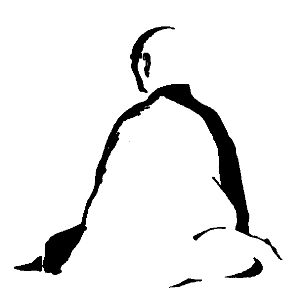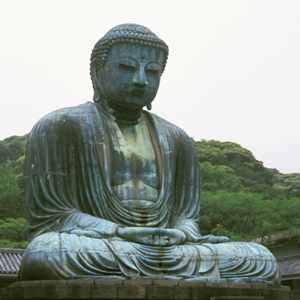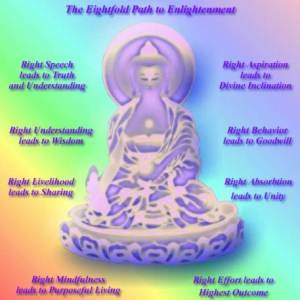The Wisdom of the Middle Way and the Noble Eightfold Path
All that we are is the result of what we have thought. If a man speaks or acts with an evil thought, pain follows him. If a man speaks or acts with a pure thought, happiness follows him, like a shadow that never leaves him.
~Buddha
 Among the fourth noble truths ministered by Lord Buddha, the last one gives his prescription on how to eliminate suffering (Dukkha) and how to trail the path of self-liberation. The prescription has eight sessions and all of them start with the word Samyak, which in Sanskrit means “done in a correct way”.
Among the fourth noble truths ministered by Lord Buddha, the last one gives his prescription on how to eliminate suffering (Dukkha) and how to trail the path of self-liberation. The prescription has eight sessions and all of them start with the word Samyak, which in Sanskrit means “done in a correct way”.
His recommendations are comprised with simple living advice to alleviate our un-satisfactions, sufferings and to release oneself from the wheel of Samsara, the cycles of life and death on which we are bonded through innumerable eons.
No one saves us but ourselves. No one can and no one may. We ourselves must walk the path.
~Buddha
In his teachings of the Eightfold path, Lord Buddha offers a practical guide for the development of our mental capabilities and beneficial abilities that need to be cultivated by the seeker in order to obtain the final liberation from the world of sufferings and to reach the supreme happiness and Nirvana. They are much more than simply behavior advice: they are skills that incite wisdom, mindfulness, expansion of awareness and consciousness.
Just as a candle cannot burn without fire, men cannot live without a spiritual life.
~Buddha
 Buddha taught the Eightfold Path to his disciples through a gradual training system, starting initially with the instruction on the development of virtues, which are correct speech, correct action, and correct way of living; progressing to the development of the abilities to concentrate, which are correct effort, correct attention, or mindfulness, and correct concentration. The pinnacle of these studies would lead the seeker to the development of Wisdom, or right understanding and right thoughts. Lord Buddha also spoke about the need for the practice of generosity as support training for the aspirant soul, in the learning path of overcoming desires and bad habits, and in the understanding of the laws of cause and effect in the life of individuals, Kamma.
Buddha taught the Eightfold Path to his disciples through a gradual training system, starting initially with the instruction on the development of virtues, which are correct speech, correct action, and correct way of living; progressing to the development of the abilities to concentrate, which are correct effort, correct attention, or mindfulness, and correct concentration. The pinnacle of these studies would lead the seeker to the development of Wisdom, or right understanding and right thoughts. Lord Buddha also spoke about the need for the practice of generosity as support training for the aspirant soul, in the learning path of overcoming desires and bad habits, and in the understanding of the laws of cause and effect in the life of individuals, Kamma.
The journey through the middle path is not necessarily linear. Instead, in each of the aspects of the Eightfold Path, the seeker can find the necessary teachings and refinement that will complement the other aspects of this journey, leading the seeker to as ascending spiral pattern of spiritual maturity that will inevitably lead to enlightenment. Even individually explained, each aspect of the teaching belongs to an organic and indivisible fabric of a higher spiritual philosophy.
There are only two mistakes one can make along the road to truth; not going all the way, and not starting.
~Buddha
- Right View - This comes through the cognitive experience of Wisdom and comprehension of the four Noble truths and their interfaced origin; it is at the same time the beginning and the end of the Eightfold Path. For those starting the journey and for those that have not reached a superior level of wisdom yet, it can be seen as the correct faith.
- Right Intention - This is also known as the right thought. Thoughts and determination precede actions or speech. To the seeker it means the practice of the right way to think, through a training of a gentle mind to become increasingly compassionate and pure. It can also be seen ultimately as a promise to the use of ethical discernment and code of moral discipline while analyzing circumstances of life.
- Right Speech - The Buddha believed in the power of the spoken word. This is one of the skills that arise with the practice of the right thought and intention; the commitment to not lie, to not use heavy and aggressive language, to not speak ill of others, to not bring false testimony against people; to not engage in idle and useless conversations; but only to use language and speech to benefit others, bringing harmony, tenderness and healing.
- Right Action - This basically means the disciplined intention to refrain from actions that would cause harm, suffering and pain to any sentient being. This ability comes from the training of the correct intention or way of thinking. To not kill, to not steal, to abstain from sexual misconduct, to practice good deeds, to vow to protect and be compassionate towards all beings through the observance of ethical and moral values.
- Right Livelihood - This precept explains the code of conduct for the right and virtuous way of living; maintaining regular healthy habits such as sleeping, eating, exercising, work. The objective is to create a harmonious way of living with all beings. It involves a way of living with the commitment of practicing respect and recognizing the dignity and value of all manifestations of life, from past, present and future. It is a promise to live a sustainable and harmonious life with all.
- Right Effort - This is an ability that develops itself from the constant practice of striving to obtain the highest possible ideals of perfection in ethics, health, faith, and harmony in creation and sentient beings; through the elimination of all that is not good through a clear mental attitude; and to bring harmony, healing, liberation and cessation of suffering to all.
- Right Mindfulness – The ability to keep an attentive and awakened mind should be the goal of the seeker of the middle path. The correct attention gives the seeker the guarantee that all the other precepts will not be forgotten or neglected. Only through the use of all the faculty of cognition is the seeker able to expand the consciousness and to perceive the focus of reality beyond the realms of illusion and impression.
- Right Concentration - In this teaching there is a clear reference to the Dhyans or meditative stages. The Buddhist method of choice is to develop right concentration through the practice of meditation. The result is the improvement of mental strength and to keep the mind clear and pure, concentrated and attentive should be the goal, in order to facilitate the manifestation and acquisition of Divine wisdom and the cultivation of a natural state of consciousness.
Peace comes from within. Do not seek it without.
~Buddha










